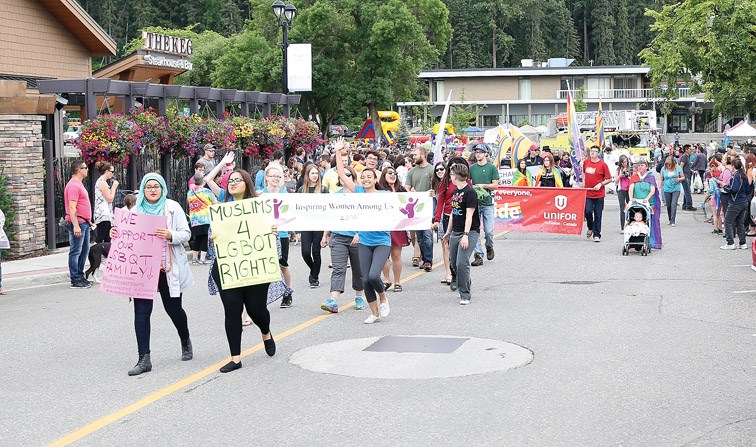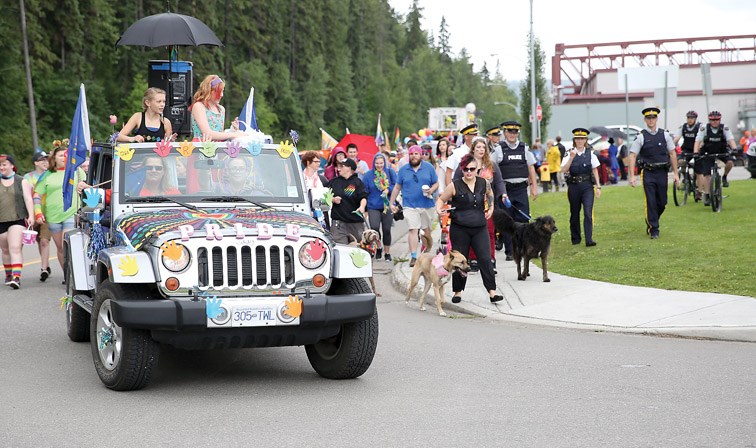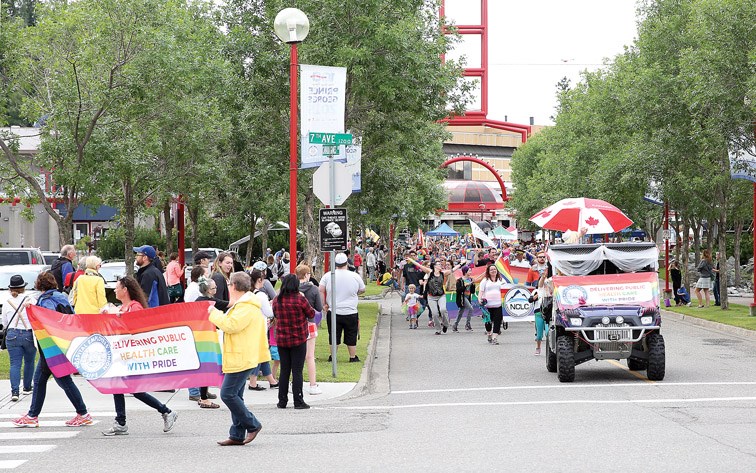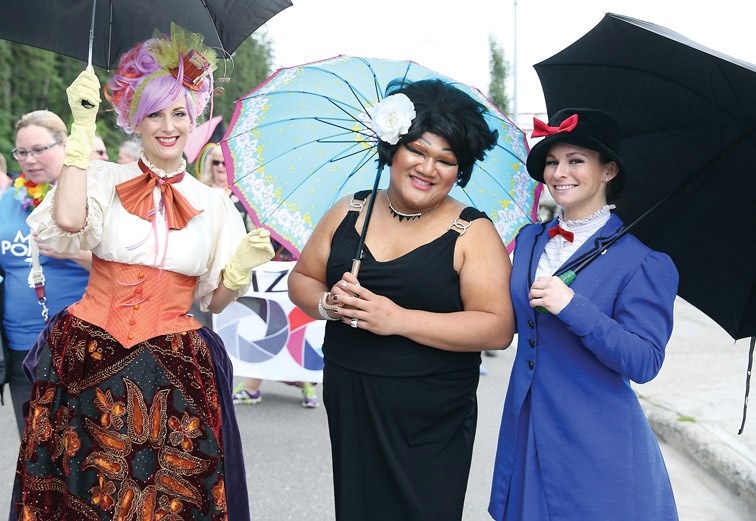Sandra Tanemura no longer has to dodge the indignity of angry people throwing vegetables at her when she takes part in the Prince George Pride Parade.
Prejudice still exists in our city against the gay community but attitudes have changed for the better, and the positive vibes she was feeling from the crowds of supporters who lined the downtown streets for the 19th annual parade made those early days of the pride movement a distant memory.
Decked out in a bright belly dance costume, surrounded by fellow dancers from Tanemura's Zahirah Dance Studio, the 40-year-old couldn't stop smiling as she and her fellow dancers performed on their float. The cheers and clapping from spectators along the parade route inspired good feelings which sent spirits soaring, but it wasn't always that way.
"I remember the first one I was involved in and I was just driving a car and I remember the car getting hit with lettuce and tomatoes from the people who were protesting," said Tanemura. "Now, look at it. You've got so many people from businesses to gay, lesbian and transgender, the whole nine yards, and it so amazing. Everything's inclusive and it's all love. We should have a parade every week.
"Unfortunately there are still close-minded people out there, but you can't please everybody. You just try your best just to be your true self. At the end of the day, the only person looking back in the mirror is you, and if you're happy with yourself, that's all that matters. My kids grew up around this and it's totally socially acceptable and it's the norm, which is wonderful."

Kyla Turner, 28, identifies herself as queer and has been attending P.G. Pride Society drag shows since she was 15. She started the College Heights diversity group while she was still in high school and joined the parades to build awareness in the general community and shatter some of the stereotypes. In 19 years of parades, she's seen an entire generation grow up knowing the aims of the pride movement.
"It was a lot smaller when I started the parades, a couple people gawking at us, and now we have this wonderful festival happening in front of City Hall and people are watching, they're not covering their children's eyes," said Turner. "It's a very different vibe. Pride is still political, it's not just saying we're here to have a good time and we're here party. It's saying we're going to carve out a place for ourselves in the world."
Parade marshalls Murry Krause and his partner of 30 years, Brian Lewis, led a long line of colourful characters and decked-out vehicles who made their way on a 40-minute march from Veterans Plaza to City Hall. For Krause, 66, now in his sixth term as a city counselor, being asked to marshall the parade as Mr. Pride PG for the first time since it all began in 1997 served as a reminder of how far the city has come in in its acceptance of people of all sexual orientations.
"We walked in the first parade and lots of people were concerned about their safety - we were worried about people on the route and there were some (anti-gay) signs - but that was a long time ago and it's a different world," said Krause. "We can see that now, just in the number of participants and the number of corporations involved,and the people who are here to support the gay and lesbian community."
Lewis, who is not a politician, felt honoured to lead the parade, even though he wasn't all that comfortable being the centre of attention.
"It's a really cool mix of scary and exciting at the same time," said Lewis. "Not being one who likes to be out in front of people, that's the scary side, but the fact Prince George is doing this and embracing it is the exciting part, and we're going to have fun."
Krause grew up in Prince George, where he was married to a woman and had children. His son from Victoria brought his wife and children to the parade Saturday. Krause got involved in starting the city's original pride festival in 1996, the year he was first elected, a time when a city bookstore was actively promoting hatred by selling anti-gay material.
"One of the most important things for me is young people feeling safer," Krause said. "We've known over the years, and it's been tragic, where young people have committed suicide because they're gay. That's why these things are important, to show the community's behind you, you're not alone, and to celebrate it.

"We're trying to attract people to our community and corporations to our community and the more diverse a community is the more attractive it is to people. We're a university town and why would you want to come to community where people feel that it's close-minded. This really is about it feeling welcome for everybody. It's exciting, it's a changing world and it is evolving."
The parade route led past the multicolored crosswalk which bisects Seventh Avenue at Canada Games Way, painted a couple months ago, a visible example of the city's year-round support of pride. Rachel Bates, the executive director of Transform, an advocacy and support group for transgender youth, says signs are everywhere Prince George has grown up in that regard.
"The city has changed a lot, it's so much more open and accepting and it's a safer space than it used to be for trans and queer people, which is an incredible stage of our progress," said Bates. "Obviously this year, in the wake of Orlando, this parade and this pride festival is a little bit more poignant than it has been in other years. It really brought attention to the fact that there's still homophobia and that we all need to work together really hard, not just the queer community but the community as a whole need to work together to combat that."

Karen McDowell, a self-described radical anarcho militant representative of the transgender community, wore camouflage clothing and a bandana covering her nose and mouth while holding a pink triangle flag, symbolic of the identification patches used to identify homosexual men in Nazi concentration camps. McDowell, 36, was the Green Party candidate or Prince George-Mackenzie in the 2013 provincial election and this was her fourth pride parade.
'I'm excited to see the growth and extra participating amongst the people who come out to see it," said McDowell. "On the surface, the city is changing because people feel like it is unacceptable (to promote hatred) but I still think there's quite a bit of animosity and a lot of fighting to keep going. I'm glad to see so many people come out and support and I don't want to take away from that today. We've come a long way, for sure."
Julia Dillabough made the trip north from Quesnel and was driving a rainbow-wrapped antique truck. Quesnel held its second annual pride parade and an all-ages event on June 12, the day of the Orlando night club shootings which killed 40 people and wounded 53.
"Quesnel has always been very supportive and we were one of the first smaller communities to have a pride (festival)," said Dillabough, 33. "We had lots of support and were able to bring the First Nations into it when we had an elder bless the start of the parade. Our city erected a flagpole this year in the name of the Quesnel Pride Society and it was put in our Friendship Centre and every time somebody has an event, their flag goes up on it. I was honoured when our mayor (Bob Simpson) said we inspired him to put the flagpole up.
"There's going to be some backlash and there are going to be haters but there's going to be more positive people and we need to focus on those positives rather than the negatives. This is only going to make people more accepting. It's not about throwing it in people's faces, that not what pride is about. It's about giving people knowledge that we're not so different."



